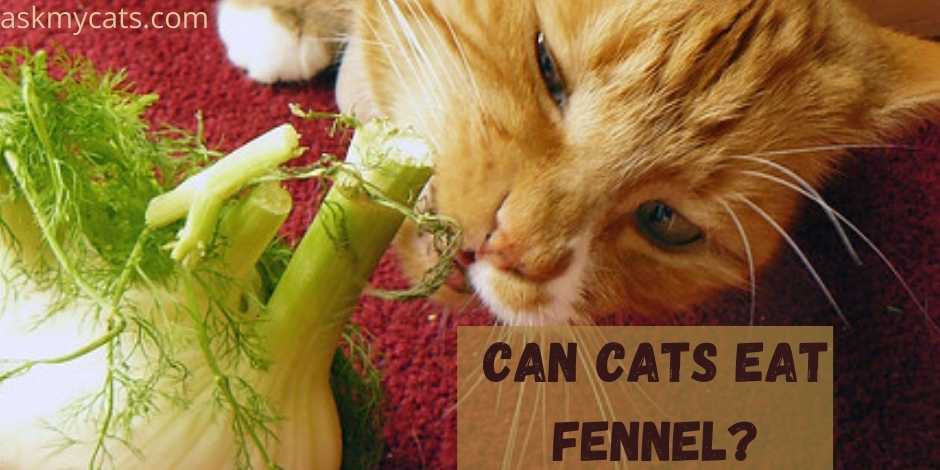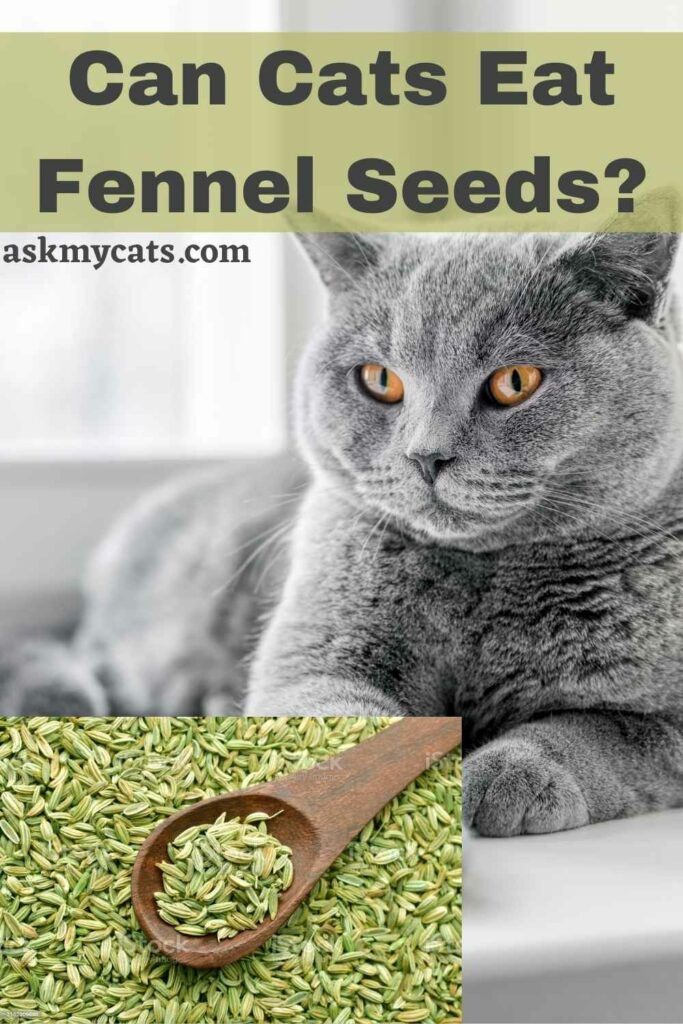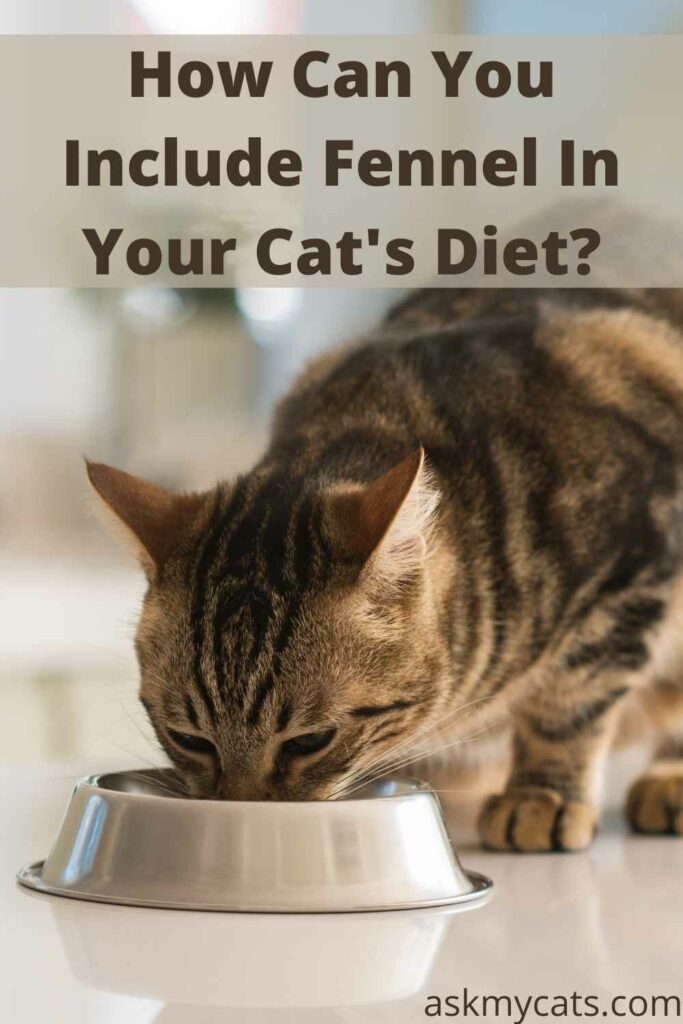Fennel is regularly used in salads, soups, and stews, and it has a long history of usage in medicine, notably for indigestion, bloating, and even infant colic. The tasty bulb, as well as the leaves and stalks of this aromatic herb, are employed.
Fennel has a distinct flavor and a wide range of applications, making it a staple in many kitchens. But can cats eat fennel?
Yes, cats can eat fennel, but only in small amounts, especially when added to their food. It is not toxic in any way. However, the ASPCA advises against using its concentrated oil because it has been linked to photosensitive dermatitis.
This article will talk about can cats eat fennel and are there any advantages to it.


Give Your Cat the Perfect Day
Get the Free Ebook!
What Is Fennel?
Fennel is a perennial, pleasant-smelling herb with yellow flowers. It is native to the Mediterranean but is now found throughout the world.
Fennel is a blooming plant that is related to carrots and parsley. This plant, which has a pale bulb and long green stalks, has spread around the world from the Mediterranean coastlines.
The bulb, stalk, leaves, and seeds of the fennel plant are all edible. Fennel is used to flavoring various meals, and fennel seeds are especially well-known for their use in Italian sausage.
Fennel has been utilized in natural treatments from the beginning of time. Fennel tea is said to improve digestion while also reducing gas, bloating, and stomach cramps.
People consider fennel to be healthful since it is high in nutrients. Fennel is high in potassium, molybdenum, manganese, copper, phosphorus, and folate and is an excellent source of vitamin C.
Fennel is edible to cats. Fennel is not poisonous to cats, but the ASPCA warns that it should only be taken in limited amounts.
Fennel isn’t likely to be a favorite of your cats. In fact, they could be more inclined to use it to play.
Is Fennel Poisonous To Cats?
No, fennel is not poisonous to cats as it is not included in the ASPCA list of toxic foods.

Cats can eat fennel. Fennel is considered non-toxic to cats, though the ASPCA cautions it should only be consumed in small quantities.
There’s a good chance your cat won’t be too interested in eating fennel. In fact, they may be more likely to play with it.
Foeniculum vulgare, Finocchio, or fennel is a sweet-smelling spice that has a place with the carrot, celery, or parsley utilized in seasoning food.
Its stems, leaves, and shoot are palatable. This lasting plant is local to Asian Minor and southern Europe.
Notwithstanding, in Australia and a few pieces of the US, it is viewed as an obtrusive plant species.
Other than being a seasoning spice, a few cultivars like the Florence fennel’s shoots, and bulb type are eaten as a vegetable.
At long last, this spice and its oil are utilized in scenting fragrances, cleansers, just as seasoning alcohols, medication, confections, cakes, fish, sweet pickles, etc.
Cats can eat Fennel, but only in small amounts, especially when added to their food.
It is not toxic in any way. However, the ASPCA advises against using its concentrated oil because it has been linked to photosensitive dermatitis.
Besides being quite nutritious, it may help improve digestion, reduce bloating and fluctuance as well as freshen your cat’s breath. It also has diuretic properties.
Can Cats Eat Fennel Seeds?
Yes, cats can eat fennel seeds as they work to relieve gastric discomfort caused by foods your dog or cat shouldn’t have eaten.

Fennel seed is a mild anti-gas and antispasmodic that can be given directly to your kitten’s diet to provide symptomatic relief while you and your veterinarian hunt for the root of the problem.
Fennel seed relieves stomach upset caused by things your cat shouldn’t have eaten.
For this, a cooled fennel seed tea is ideal: one teaspoon of fresh or dried seeds (fresh is preferable) in eight ounces of boiling water, steeped until cold.
Give two to four teaspoons of cooled tea for every 20 pounds of body weight in a cat, or mix it with drinking water as much as the cat will allow.
Give ten to twenty drops (more accurately, up to 0.75 ml) per 20 pounds of canine weight (ten drops for cats) as needed with a glycerin tincture.
Fennel has various quantities of linoleic acid and is strong in vitamins C and A, calcium, iron, and potassium. It’s especially beneficial for cats who have persistent indigestion that isn’t caused by a specific illness.
Fennel also aids in the stimulation of appetite and the freshening of breath by acting as an antibacterial in the mouth and reducing belching.
Do Cats Like The Smell Of Fennel?
Whether a cat will like the smell of fennel or not purely depends on its personality, as fennel has no particular smell that attracts a cat.
The Fennel aroma is neither on the list of popular scents that cats despise nor on the list of scents that cats prefer.
Drinking soup with fennel will reveal this. Try to check whether your cat is purring and walking about when you are eating it. If yes, then your cat likes the smell of Fennel.
Benefits Of Cats Eating Fennel
The benefit of cats eating fennel is that they can get extra vitamin C and fiber in their diet if they are lacking it.
“Health foods” provide nutrients that are necessary for our well-being. On the other hand, Cats don’t always require the same dietary sources of specific nutrients as humans do.
For example, all animals require enough vitamin C to survive, and the majority of them produce it in their livers. Because humans’ livers do not manufacture enough vitamin C, people must consume vitamin C-rich meals.
On the other hand, Cats produce plenty of vitamin C in their own livers, so they don’t need to consume fennel to meet their vitamin C requirements. A little extra of these water-soluble vitamins won’t hurt a cat; they just don’t need it.
Similarly, fennel includes a significant amount of fiber, which cats do not require. In fact, fiber-rich food can help cats relieve constipation.
The first important thing to know is that cats are obligate carnivores, which means that meat is all they require. Because cats get most of their nourishment from meat, there isn’t much of a health benefit for consuming fennel.
Drawbacks To Cats Eating Funnel
There aren’t any particular drawbacks to cats eating funnel if it is given in moderation.
Because cats can’t digest fennel leaves and stems, don’t give them too much because it can cause gastrointestinal problems, including diarrhea, stomach disturbances, and vomiting.
Also, if your cat is sensitive to this herb, breastfeeding, or pregnant, avoid using it, and if possible, utilize organic sources of this plant.
Additionally, wash it before giving it to your dog to eliminate any dirt, chemicals, herbicides, or insecticide residue.
Finally, because it has a licorice or anise-like aroma, some cats may refuse to eat it, particularly cooked ones or seeds, while others will find it delectable.
Can Kittens Eat Fennel
Yes, kittens can eat fennel, but it is recommended not to feed it to them as they need the food that is meant for them to grow up healthy.
Because kittens are so small and haven’t fully formed, they are more vulnerable to things than adult cats. Any pollutants in fennel are more likely to affect a kitten than an adult cat, notwithstanding their rarity.
In the same way, kittens are more sensitive to the laxative effects of fennel fiber. This could result in diarrhea, dehydration, and a trip to the veterinarian.
Instead of fennel, try feeding it kitten food. This sort of food has everything your kitten requires to grow into a healthy, robust adult without including anything harmful.
How Can You Include Fennel In Your Cat’s Diet?
You can add fennel to your cat’s diet in a variety of ways, and the bulbs, stalks, leaves, and seeds are all safe for your cat.

Fennel is regularly used in salads, soups, and stews, and it has a long history of usage in medicine, notably for indigestion, bloating, and even infant colic.
The tasty bulb, as well as the leaves and stalks of this aromatic herb, are employed.
Fennel has a distinct flavor and a wide range of applications, making it a staple in many kitchens.
Is it, however, safe for your cat? Is it safe for your cat to consume fennel?
Yes, to put it succinctly. Fennel is entirely safe for cats to eat and provides various potential health benefits as well as a lot of nutrition.
Fennel is edible in a variety of ways, and the bulbs, stalks, leaves, and seeds are all healthy for your cat to eat.
However, your cat may not enjoy the plant’s strong aromatic scent. This makes it tough to incorporate into your cat’s diet, and you may have to hide it in other foods.
Fresh fennel plants may be found in most supermarkets, or the dried seeds and blossoms can be found in the spice section.
You can create a little fennel tea with the seeds and put it in their water bowl. Begin with a modest amount and gradually increase it, as too much may cause diarrhea.
It’s critical to consider your cat’s size and weight when determining the appropriate amounts.
You might also try putting the seeds on your cat’s food but start with a small amount at first because they might not like the aroma.
Finally, you can boil the bulbs and incorporate them into your cat’s diet. Because the bulb has a strong flavor, slice it into very little pieces.
It’s a good idea to see your veterinarian if you’re unclear how much to give your cat. Fennel is completely healthy for cats, but too much of it at once can create stomach issues.
Frequently Asked Questions
Can cats eat other herbs like licorice root?
Licorice root is not only tasty, but it is also be beneficial to your cat’s health. Because it soothes mucus membranes, licorice root can help itchy cats with allergies, endocrine (the endocrine gland regulates metabolism, development, and mood) and digestive difficulties, as well as respiratory problems like colds. The licorice root also has blood cleaning and anti-inflammatory effects, making it beneficial for cats with arthritis.
Is valerian healthy for cats?
Valerian is a spicy plant that is best recognized for helping people relax and sleep well. Valerian is a cat stimulant that can help turn lethargic, overweight cats into activity machines. When you combine this with the fact that cats enjoy eating the plant, you’ve got the perfect recipe for a happy, healthy feline.
What are healthy alternatives for fennel?
Fennel may be a tasty and healthful treat for your cat, as well as a pleasant change of pace from their regular diet. Nonetheless, there are numerous healthy alternatives to feeding fennel to your cat. If you truly want your cat to eat vegetables, look for a cat food that has been specially made to fulfill the feline’s nutritional requirements. Taste of the Wild Grain Free High Protein Natural Dry Cat Food includes a range of fruits and vegetables, as well as venison and salmon, for a nutritious and balanced diet for your cat.
Final Words
Fennel is an excellent addition to your cat’s diet, as it has a number of potential health advantages as well as some minor adverse effects.
Fennel can aid with stomach issues like bloat and constipation, as well as acting as an immune booster, in addition to refreshing your cat’s breath. Fennel is also a cheap and easy-to-grow herb, making it a quick and easy method to supplement your dog’s diet with additional nutrients.
A modest bit of fennel is fine for cats from time to time. Just make sure you carefully wash the fennel before feeding it to your cat.
A little variation can be a fun way to spice up your cat’s life as long as his diet consists mostly of well-balanced cat foods.
For any other queries, keep it right here at askmycats.com.
